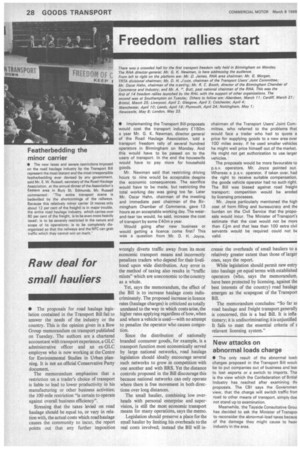Raw deal for small hauliers
Page 30

If you've noticed an error in this article please click here to report it so we can fix it.
• The proposals for road haulage legislation contained in the Transport Bill fail to answer the needs of the industry or the country. This is the opinion given in a Bow Group memorandum on transport published on Tuesday. The authors are a chartered accountant with transport experience, a GLC administrative officer and an ex-GLC employee who is now working at the Centre for Environmental Studies in Urban planning. It is not an official Conservative Party document.
The memorandum emphasizes that a restriction on a trader's choice of transport is liable to lead to lower productivity in his manufacturing or other business activities; the 100-mile restriction "is certain to operate against overall business efficiency".
Stressing that the taxes levied on road haulage should be equal to, or vary in relation with, the actual costs which road haulage causes the community to incur, the report points out that any further imposition wrongly diverts traffic away from its most economic transport means and incorrectly penalizes traders who depend for their livelihood upon wide distribution. Any error in the method of taxing also results in "traffic mixes" which are uneconomic to the country as a whole.
Yet, says the memorandum, the effect of the Bill is to increase haulage costs indiscriminately. The proposed increase in licence rates (haulage charges) is criticized as totally unrelated to the way in which costs arise, the higher rates applying regardless of how, when and where a vehicle is used—with no attempt to penalize the operator who causes congestion.
Since the distribution of nationally branded consumer goods, for example, is a transport function most economically served by large national networks, road haulage legislation should ideally encourage several such networks to grow in competition with one another and with BRS. Yet the distance controls proposed in the Bill discourage this because national networks can only operate where there is free movement in both directions over long distances.
The small haulier, combining low overheads with personal enterprise and supervision, is still the most economic transport means for many operations, says the memo.
Legislation should preserve a place for the small haulier by limiting his overheads to the real costs involved; instead the Bill will in
crease the overheads of small hauliers to a relatively greater extent than those of larger ones, says the report.
While legislation should permit new entry into haulage on equal terms with established operators (who, says the memorandum, have been protected by licensing, against the best interests of the country) road haulage emerges as the scapegoat of the Transport Bill.
The memorandum concludes: "So far as road haulage and freight transport generally is concerned, this is a bad Bill. It is inflationary; it is undiscriminating; it is unjustified It fails to meet the essential criteria of z relavant licensing system."




































































































































